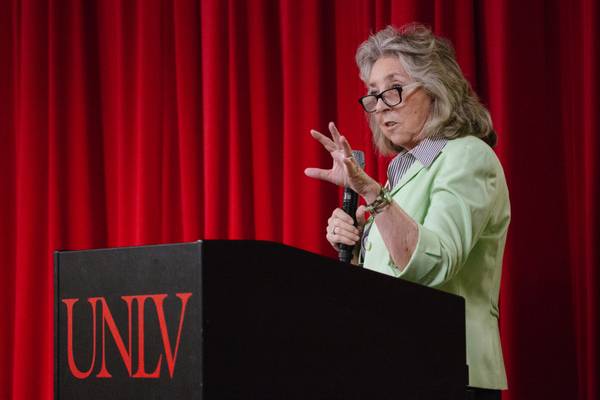U.S. Rep. Dina Titus, D-Nev., said Monday on “Nevada Newsmakers” that she is co-sponsoring a bill in the U.S. House to keep DACA recipients’ files away from federal immigration authorities.
Titus is concerned that the information provided to the federal government to enter the Deferred Action for Childhood Arrivals program could help immigration authorities round up DACA immigrants for deportation if and when the program is eliminated.
President Donald Trump has given Congress six months to pass legislation regarding the 800,000 DACA recipients in the U.S. They are facing deportation because they were brought to the U.S. illegally as children or came with families who overstayed visas.
The 5-year-old policy has allowed DACA recipients to remain in the country without fear of immediate deportation and has granted them the right to work legally. About 13,000 live in Nevada.
“I am a co-sponsor of a bill to protect that information because ... they (DACA recipients) tried to do the right thing,” Titus said. “They followed the rules and they turned in their information. This information can be used to go after not only them but also their families, because, now, they (immigration officers) know where they (DACA recipients) live, where to find them and where they work. It's terrible.”
Since Trump was elected last November, Titus' offices have received an increased number of calls, complaining about stricter or rougher relations with federal immigration authorities, including Immigration and Customs Enforcement.
Although House Speaker Paul Ryan, R-Wis., has told DACA recipients to "rest easy" because Congress will find a solution, Titus is concerned about what might be in the Republicans' possible bill.
“The talk was that they would trade it (DACA legislation) for funding of ‘the wall,’” Titus said. "That's really not going to solve the problem, and that is something that the Democrats won't support.”
Senate Democrats, including Sen. Catherine Cortez Masto, and the Congressional Hispanic Caucus have already said the Dream Act of 2017 is ready to be considered. The Dream Act, in its various versions, has been proposed each year since its inception in 2001. It provides a road to legal but conditional permanent residency, but not citizenship.
"We want to protect DACA children and certainty we will do everything we can," Titus said. "But I'm not certain Republicans are really sincere about fixing it. We've got the bill (Dream Act of 2017). We did a conga line on the (U.S. House) floor yesterday saying bring it forward. He (Ryan) could solve that problem today, if he really wanted to.”
Having an election next year could be a factor that may help DACA legislation getting passed in the next six months, Titus said. Nevada's 2018 primary election, which could be critical for some in Nevada's federal delegation, is 10 months away (June 12).
"I think you can do DACA (in six months),” Titus said. “Comprehensive (immigration) reform will take longer … Maybe there will be some appetite for it leading into the next election because the demographics in this country are changing. And if Republicans want to get any votes out of the minority communities, they need to take some action."
Titus said she is dismayed that Nevada has not joined a lawsuit along with 15 other states and the District of Columbia, which tries to block Trump's plan to end DACA protection.
The attorneys general who brought the lawsuit — all Democrats — are from states with substantial DACA recipients. Nevada Attorney General Adam Laxalt is a Republican.
“I'm just sorry that our (Nevada) attorney general is not a part of that group filing suit (on behalf of DACA recipients),” Titus said.
Trump's tweets on DACA are sowing seeds of confusion in the immigrant community, Titus said.
“The thing that concerns me is that it causes so much uncertainly,” Titus said of Trump's tweets. “First, he ends the program. Then, it is for six months. Then it is for six months and then if nothing happens, he'll visit it again.
“Then he tweets, 'Don't worry (DACA recipients) we are not coming after you for six months," Titus said. "This just causes more uncertainty in my district and more uncertainty and fear among the DACA recipients because they don't really know what is going on."
Ray Hagar is a retired political journalist from the Reno Gazette-Journal and current reporter/columnist for the Nevada Newsmakers podcast and website, nevadanewsmakers.com. Follow Ray on Twitter at @RayHagarNV.

